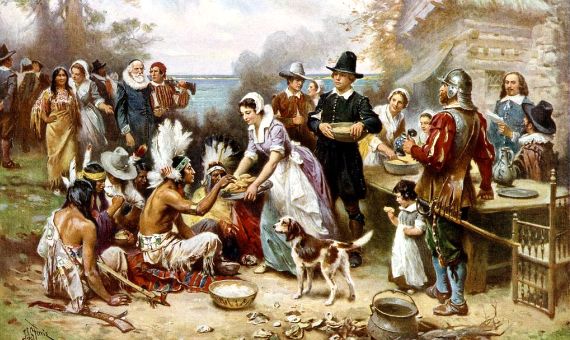Although Thanksgiving is celebrated in more countries than just the United States, the cinema has helped popularize the American version of the event around the world: a family gathering around a roast turkey dinner with cranberry sauce, on the fourth Thursday of November, a prelude to the Christmas preparations that commence the following day with Black Friday shopping. Americans learn that the source of their celebration dates back to the Pilgrims of Plymouth in the current Massachusetts, who, in 1621, celebrated the success of the harvest one year after founding their colony in the New World. However, the true origin is more complex with its roots going back to traditions imported from the European continent.
One of the most knowledgeable people in the world on the celebration of Thanksgiving is Jeremy Dupertuis Bangs. This historian, born in Oregon and settled in Holland, runs the Leiden American Pilgrim Museum, which preserves and researches the memory of the passage through this Dutch town of the Puritan exiles in Britain before their emigration to America. The Pilgrims, mainly Calvinists, were impregnated in Leiden with the religious celebrations in that city that annually commemorated the victory against the siege of Spanish troops on October 3, 1574, during the Eighty Years’ War. “The Pilgrims thought the Dutch reformers were right to deviate from the traditional Catholic holidays, replacing them with

events rooted in the Bible,” explains Bangs to OpenMind. “The commemoration of Leiden lasted a week or a little more, and included religious sermons and prayers, feasts, military exercises and a street market.”
For Bangs, the 1621 event was a combination of the heritage of Leiden and the staunchly biblical spirit of the Pilgrims, without roots in the English harvest festivals dominated by the Anglicanism that the settlers sought to leave behind. “What they tried to do was organize their lives according to biblical example, and in Deuteronomy one finds instructions on how to organize a harvest festival that even includes strangers (which would explain the invitation to the Indians),” he adds.
According to the historian, the modern form of the Thanksgiving feast emerged in the nineteenth century when the celebration of 1621 was rediscovered and promoted as being the first one in history. However, not everyone agrees with this assessment. Other experts have suggested earlier celebrations that, even if they haven’t left their mark on the current rite, often encourage lively debates. Perhaps the best-known case is that of the historian and professor emeritus at the University of Florida Michael Gannon, who places the first Thanksgiving celebration in Florida at the hands of the Spanish.
In 1564 a community of Huguenots, French Calvinists, arrived on the coast of Florida near present-day Jacksonville. They were the first European settlers on the continental United States, but their presence did not last long; the following year, the Spanish pioneer Pedro Menéndez de Avilés founded the city of San Agustin there and massacred the small French settlement, following the orders of King Philip II to eliminate the presence of Protestants. San Agustin was the first permanent city in the continental United States, and there, Gannon argues, the first Thanksgiving was held. The theory caused such a stir that “in New England they nicknamed him the Grinch who stole Thanksgiving,” says writer Robyn Gioia to OpenMind, which has expanded and published the findings of Gannon. Gioia explains how Gannon responded to the sense of humor of his countrymen: “Chuckling, he said that in 1621, when the Pilgrims were celebrating their first Thanksgiving, San Agustin was already in need of urban renewal.”
However, Gioia recognizes that the religious ceremonies of Thanksgiving were frequent at the time, making it difficult to find a first. What about the Huguenots, or the previous expeditions like that of Ponce de Leon? “At that time, the Thanksgiving of San Agustin would have been one among others no less distinguished,” concedes the writer. But citing Gannon, he informs us that the difference in the case of San Agustin is the word “permanent”. “It was the first community religious act of Thanksgiving in the first permanent European settlement, as Gannon wrote in his book The Cross in the Sand (1965).” Gioia admits that that celebration did not create the current one, as did that of Plymouth. “History is written by the victors,” he reflects, but adds: “Some current history books refer to the celebration of the Pilgrims as the first English Thanksgiving and to St. Augustine as the oldest city in the nation that held a Thanksgiving.”
Comments on this publication